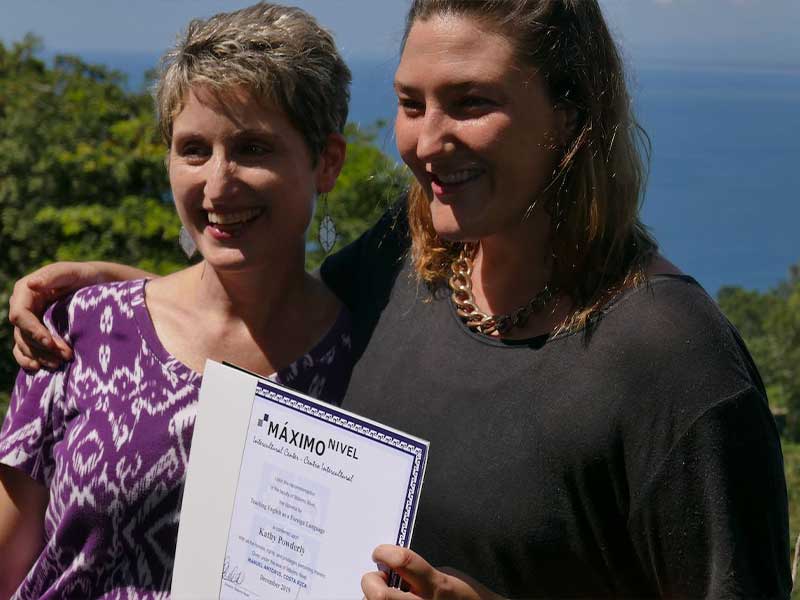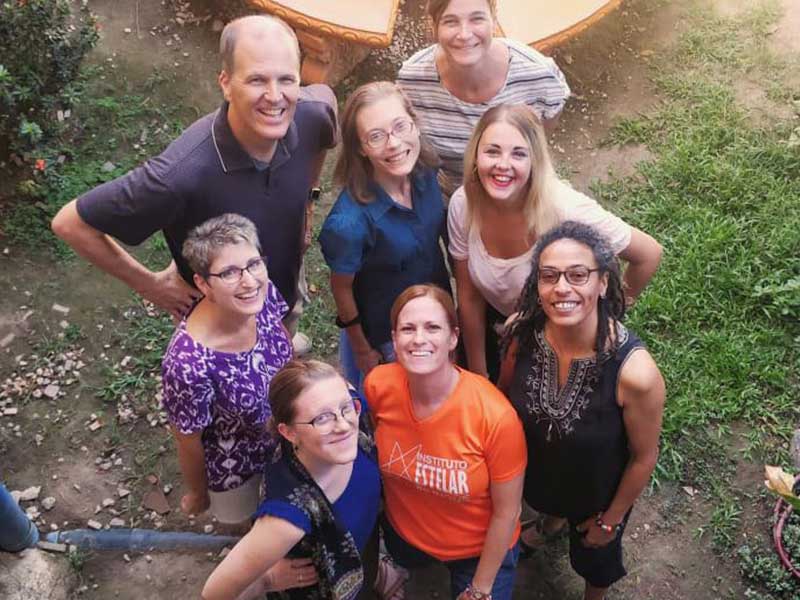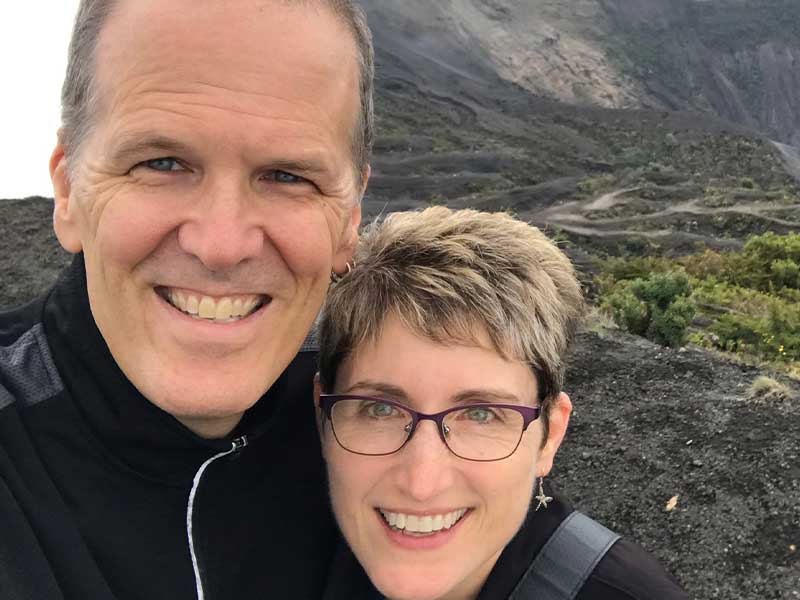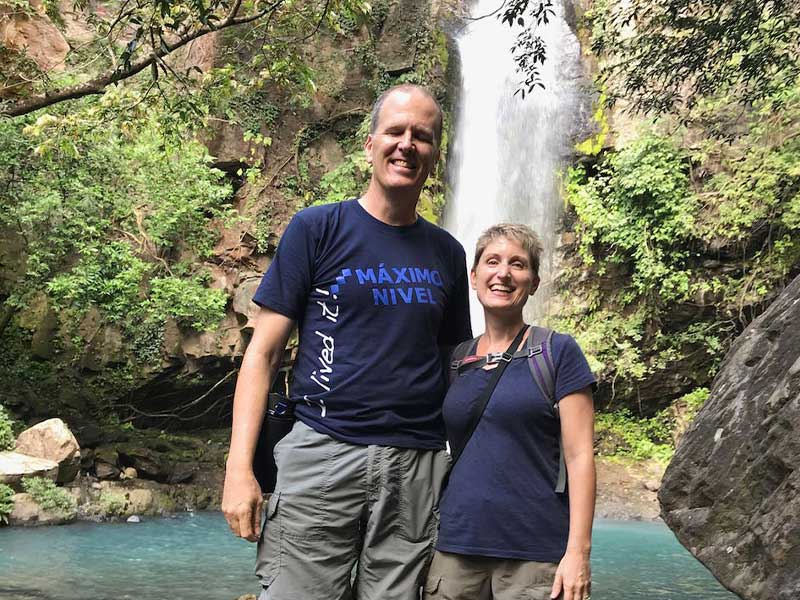Meet Kyle and Kathy, a lovely couple from the States that took a sabbatical year to become TEFL certified at our TEFL training center in Manuel Antonio and teach English Costa Rica. Here is their story:

Tell us a bit about yourself?
Both my wife and I were in ministry before moving here—I am a pastor, she was Director of a regional multi-faith religious coalition. We’d both had (for decades) wanted to live in another country, and the timing worked out for us to do so in late 2019. So we put our notice in with our employers, put our house up for sale, gave away, donated, and sold a good bit of personal possessions, stored the rest, kissed family and friends farewell-for-now, and transplanted our lives to Costa Rica.
I’m a native of Maryland, but have lived around the United States more than a bit—Washington, D.C., Pennsylvania, California, Connecticut, New Jersey, South Carolina. But until I was married I’d only been outside the U.S. twice: once on a weekend mission trip helping build an orphanage in the Baja peninsula of Mexico, and one short day-trip to Ottawa in Canada, when visiting a friend in a ministry internship in far-upstate New York. Since getting married, I (and my wife!) have visited St. Lucia, Ireland, Malta, Indonesia, and Belize.
What inspired you to get Certified to Teach English Abroad?
The six months to one year we planned to be in Costa Rica was too long to qualify as a paid sabbatical for me (I’m entitled to one every five years), so we needed a way to support ourselves financially. I enjoy teaching as a pastor and my wife was (is) an ACEs master trainer, so teaching seemed a natural way to go.
Why did you choose Costa Rica?
It wasn’t as much choosing Costa Rica as it was choosing Máximo Nivel. After doing a lot of research, it came down to two TEFL companies and, after a terrific and wide-ranging conversation with Andy, we felt strongly Máximo Nivel was the better company. That meant our choices for where to live were Guatemala, Peru, or Costa Rica and, of those three, Costa Rica was best for a number of personal and logistical reasons.

What did you find most challenging about the TEFL course?
If you’re wondering what we found hardest about the training in Manuel Antonio, for me there were two things. One was developing the new discipline of not talking. I’m a natural talker and trying to teach English in English to people who don’t speak English meant a lot of NOT explaining things! The other was finding my command voice; I am beyond passive when asking people to do things, but I was able to find my way into commanding yet being polite: “[student], read the first sentence, please.”
What do you wish you would’ve known before getting TEFL certified?
I wish we knew that married couples rarely, if ever, get time off together. Either you work for different schools on different schedules, or you work for the same school that will never let two teachers take vacation at the same time.
And, speaking of vacation: I wish I knew to ask at the time of interview what kind of holiday/time-off/paid vacation schedule the school has. Some schools, apparently, have a more liberal schedule than others, or at least pay their teachers for holidays when the school is closed.

What have you been up to since you graduated?
The day of graduation we accepted positions teaching with Instituto Estelar Bilingüe in Liberia, Guanacaste. Few, if any, schools would hire married couples, but Estelar was OK with that, and it turned out to be a good choice for us. For one, we ended up in a city where not too many people spoke English, so it helped expose us more to daily Spanish. For two, Liberia is a great city to live in—the people here are very kind and friendly. For three, no mosquitos! It’s a dry climate so, despite it getting hotter here than anywhere else in the country—it routinely hits 32ºC (90ºF) here—we didn’t need all the bug repellant we brought with us.
We found a small apartment just south of center city Liberia, in the historic Barrio Condega, 100 meters east of the famous Guanacaste tree in the middle of the intersection. We’ve come to think of Liberia as home: we have places we stop around the city on our daily walk, like the Latter Day Saints church, where a few rather large iguanas have made the campus their home, the carnecería that has the most amazing, thick corn tortillas, the woman and her mother who sell empanadas from a counter at the gate of their house; we have our regular people at la feria from whom we buy our cuadrados (our favorite banana), or papaya and piña, or eggs; we know which grocery store stocks which things we need and which street vendors have the better aguacates or mangos; we even have a homeless guy we run into from time to time who really appreciates that we don’t hand out money, but are happy to share our Tosh bars.
We discovered some pretty amazing places in the city to eat or hang out with other teachers, some of which (sadly) closed permanently during the pandemic, others that closed but are re-opening in new locations, and some that soldiered-on through the shut-down…with whom we figured out a way to order para llevar either through Servicio Express or directly using WhatsApp.
We arrived in Liberia the week before Christmas 2019, so we had a chance to experience some of the cultural events in parque central and the Paso del Niño on Christmas Eve, which culminated (for the first time) with the bringing into the Cathedral of the Christ child and the entire nave lighting up with the most amazing (and some gringo Catholics might say “tacky”) nativity scene. It was one of the most joyful Christmas masses I’ve ever been to.
We also had a chance to experience the Fiestas Civicas in late February, from the cannon shots at 5AM every morning to the last horses and riders of the topé on the last Saturday…it was all absolutely amazing. Oh, and at the final concert of the fiestas my wife and I got out on the dance floor in the midst of 200 or more Ticos doing our best to salsa. Sadly, it was the last civic event in our time here.
But thanks to the pandemic and teaching on-line, we have been able to travel some—Turrialba, Cartago, Irazu, Arenal & La Fortuna, and Rincon de la Vieja (which we can see from our apartment in Liberia!). After our contract we traveled to the east coast of Costa Rica, staying in Tortuguero for my wife’s 50th birthday.

Were you able to find a job immediately?
Yes, in no small part thanks to the connections Audra, our trainer, had with schools all around Costa Rica. Her knowledge and connections, and Máximo Nivel’s reputation, opened a lot of doors for us.
How was your time in Costa Rica during COVID?
We seriously considered returning to the U.S. when the lockdowns first started both here and in the States. Long story short: we decided to stay—as did two other teachers at the school—and take on the added stress of figuring out how to teach on-line using our existing curriculum. It was difficult not being able to teach as we’d been trained to do and were doing for the first 2-1/2 months here.
We didn’t think the school would survive a loss of the majority of their students either because families couldn’t afford it or because they didn’t have good enough Internet connections for video learning. We have been grateful and blessed to have worked closely with the owner of the school throughout this, and built a friendship with her and the other two teachers who stayed after the lockdown.
We missed out on a LOT of experiences we would have otherwise enjoyed of Tico culture and getting to know people better, but going through the pandemic in a strange land has added significant dimension to our experience here.

What is the best piece of advice you’d give other couples looking to teach English abroad?
I don’t know how colleagues and (those who became) friends did this by themselves. I can’t imagine going through this experience without my wife.
That being said, this sort of experience is only for couples who have been, or can go through, the crucible together. Doing this will burn away a lot of “cruft” in your life and soul, it will change you. At times you will want to stark-raving mad, but as Paul Reiser wrote in his book Couplehood, “In marriage, only one of you has to be sane to talk the other one out of their tree, so they can then talk you out of your tree.”
Will you continue to teach English in the future?
No. While it has been a wonderful experience, this has also been a time that has reminded me of all the things I miss about being a pastor of a church, and so I am searching for a congregation back in the U.S. Now, if I could find a Reformed church here in Costa Rica to pastor, you bet we would stay!

Do you think a TEFL certificate should be required to teach English?
Yes, I think that training is even more important than a university degree! The certification taught me the PRAXIS of teaching, which no academic preparation at the Bachelor’s or Master’s level ever did.
We have a friend we teach with here who is held back from some English teaching jobs because she doesn’t have a bachelor’s degree, yet she is an absolutely top-notch teacher. It’s a shame the schools in China want the degree more than the certification…
Would you recommend Maximo Nivel’s TEFL Certification?
Absolutely! I cannot imagine we’d have had better preparation to teach going anywhere else.
